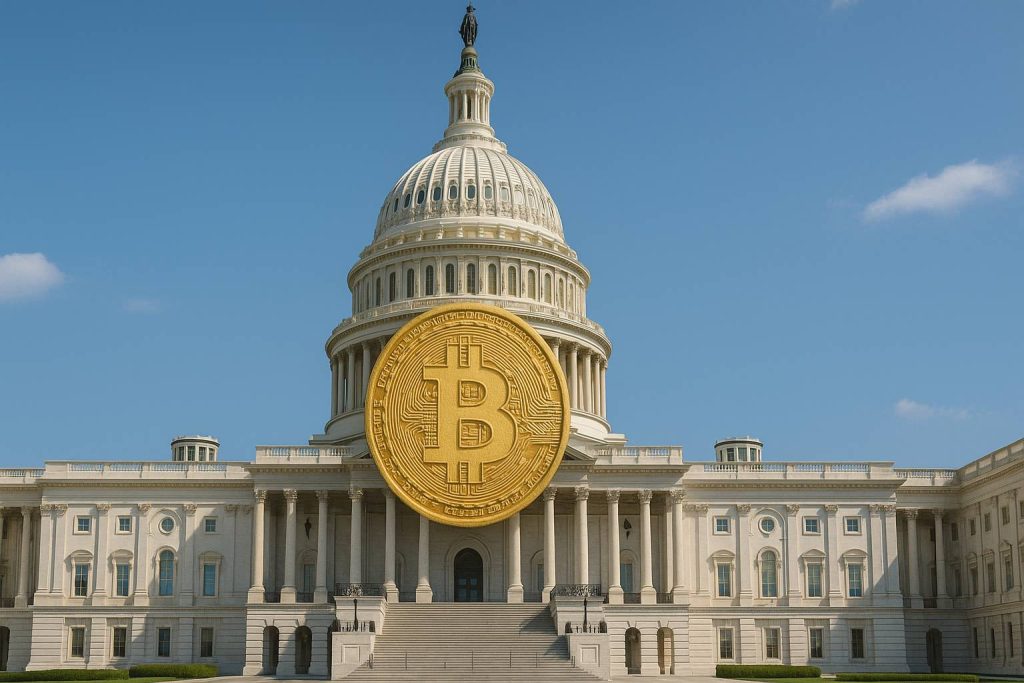Historic GENIUS Act: Why the First US Crypto Law Urges Tangible Assets
This regulatory breakthrough creates both opportunities and risks for crypto-focused investors. While stablecoin legitimacy increases institutional adoption potential, the new compliance framework introduces operational complexities and potential market concentration that sophisticated investors are already hedging through strategic allocation toward physical assets completely independent of cryptocurrency regulation.
This Article Covers:
- GENIUS Act regulatory framework impact on $250 billion stablecoin market
- Why new compliance requirements create operational risks for crypto investors
- How regulatory clarity paradoxically increases cryptocurrency market volatility
- Why investment-grade collector cars offer protection during crypto market transitions
- How MCQ Markets provides access to automotive assets with proven track records
GENIUS Act Implementation: Regulatory Framework Creates New Market Dynamics
The legislation creates a regulatory framework for the $250 billion stablecoin market, with stablecoins viewed as relatively safe cryptocurrency since their value is pegged to other assets like the dollar. However, this safety perception may prove misleading as new regulatory requirements create concentration risks among fewer compliant issuers.
The House approved the GENIUS Act with a 308-122 vote following initial conservative opposition, demonstrating political consensus around cryptocurrency regulation that extends beyond simple market legitimacy to comprehensive oversight mechanisms. This regulatory certainty comes with operational complexity that creates new categories of compliance risk for investors.
The Act represents the first major crypto legislation ever passed by Congress, establishing precedent for additional regulatory frameworks targeting other cryptocurrency sectors. This regulatory momentum suggests increasing government oversight across all digital asset categories, creating compliance uncertainty that extends far beyond stablecoins to the broader cryptocurrency ecosystem.
Cryptocurrency Regulatory Risk: Why Government Oversight Creates Investment Vulnerability
Historical precedent demonstrates how regulatory frameworks evolve unpredictably. Banking regulations, securities oversight, and commodities frameworks have experienced multiple revisions, interpretations, and enforcement changes that created significant compliance costs and operational disruptions for affected industries and their investors.
The stablecoin framework introduces specific operational risks that extend beyond individual cryptocurrency projects. Required reserve backing, auditing procedures, and federal-state coordination create multiple points of potential regulatory friction that could impact market liquidity, operational efficiency, and competitive positioning across the entire sector.
Professional money managers recognize that regulatory legitimacy often precedes increased government oversight and potential policy reversals. The GENIUS Act creates the foundation for expanded cryptocurrency regulation that could include additional compliance requirements, operational restrictions, or policy changes that affect investor returns and market access.
Market Concentration Risk: Why Regulatory Compliance Creates Systemic Vulnerabilities
Compliance costs associated with reserve backing, auditing procedures, and regulatory reporting favor larger issuers with existing operational infrastructure and regulatory relationships. Smaller stablecoin projects may exit the market or merge with compliant competitors, reducing diversity and increasing systemic risk across the cryptocurrency ecosystem.
The regulatory framework creates potential for policy-driven market disruption through changes in compliance requirements, enforcement interpretations, or political shifts affecting cryptocurrency oversight. This regulatory dependency introduces correlation risk between stablecoin performance and government policy decisions that investors cannot control or predict.
Market analysts recognize that regulatory frameworks often evolve through additional legislation, agency interpretation, and enforcement actions that can substantially alter operational requirements and competitive dynamics. The GENIUS Act establishes baseline regulation that serves as foundation for expanded government oversight rather than final regulatory settlement.
Alternative Investment Strategy: Physical Assets During Regulatory Transition Periods
- Regulatory Independence: Values determined by scarcity, craftsmanship, and collector demand rather than government compliance or policy frameworks
- Policy Immunity: Performance unaffected by cryptocurrency regulations, compliance requirements, or digital asset oversight changes
- Tangible Security: Physical ownership that cannot be altered by regulatory interpretation, government policy, or compliance framework modifications
- Market Stability: Appreciation based on fundamental supply and demand factors rather than regulatory approval or political support
MCQ Markets: Investment Grade Collector Cars During Cryptocurrency Regulation
The collector car market’s independence from cryptocurrency regulation makes it particularly attractive during current digital asset uncertainty. While stablecoin issuers navigate compliance requirements and operational restrictions, collector cars like our portfolio vehicles continue appreciating based on motorsport heritage and a supply that’s almost entirely divorced from regulatory considerations.
The platform leverages advanced authentication technology including detailed provenance research to ensure each vehicle’s value and uniqueness is comprehensively validated. This approach creates investment security based on verifiable racing history rather than regulatory compliance.
Investment Outlook: Navigating Regulatory Uncertainty Through Exclusive Automotive Assets
This regulatory transition reinforces fundamental investment principles: sectors dependent on government approval face inherent volatility that can be mitigated through strategic allocation toward tangible assets with established track records. The cryptocurrency industry’s current regulatory challenges demonstrate why building resilient portfolios requires assets that maintain value regardless of political cycles or policy changes.
Strategic investors recognize several key factors driving current alternative asset allocation:
The GENIUS Act affects the entire cryptocurrency ecosystem, creating broad-based regulatory uncertainty that extends beyond stablecoins to digital asset platforms, trading venues, and related service providers. This systemic impact highlights the importance of portfolio diversification through assets that exist completely outside government oversight requirements.
MCQ Markets bridges this gap by providing institutional-quality access to investment-grade collector car investments. Our platform combines professional automotive research with modern investment technology to create access to this historically stable asset class.
The regulatory complexity introduced by the GENIUS Act creates an opportunity for investors seeking assets that remain unaffected by cryptocurrency oversight or digital asset policy changes. As stablecoin markets navigate compliance requirements and operational restrictions, championship heritage vehicles continue operating in markets driven by racing history and motorsport achievement rather than government approval.
The current regulatory environment demonstrates why successful portfolio construction requires assets that maintain value independent of policy frameworks. While cryptocurrency regulation creates new compliance categories and operational complexities, motorsport heritage investments continue delivering returns based on racing provenance and championship legacy.
MCQ Markets provides infrastructure and expertise to access this asset class through our proven fractional ownership model enhanced with comprehensive provenance research, combining modern investment technology with time-tested stability of championship-proven collector vehicles.





